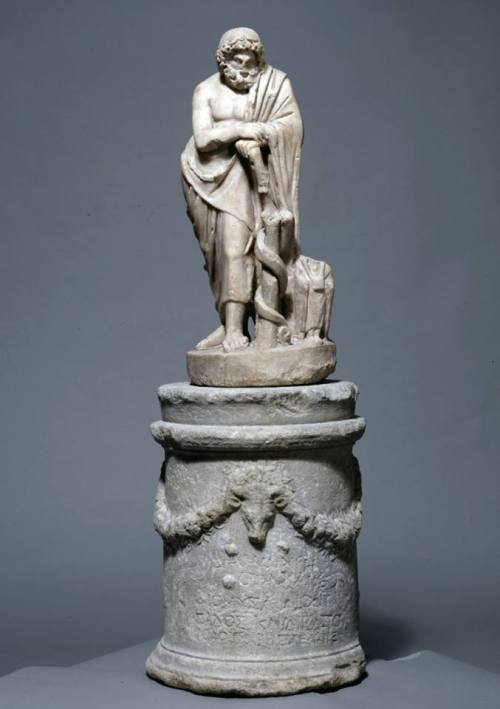#asclepius mysteries
Ὀγδόη Μεσοῦντος/ Ὀγδόη ἐπὶ δέκα / Όκτωκαιδεκάτη, XVIII day
From today’s sunset: eighteenth day of Boedromion.
‘Epidauria’
Epidauria, or Asklepieia, the annual festival of Asklepios in Athens. According to Pausanias and Philostratos, Asklepios originally came to Athens on this day to be initiated into the Mysteries, and, because He was late, an extra festival day was created to accommodate him: “The Athenians say that they initiated Asklepios into their Mysteries on that day, and since that time they paid divine honors to Him.”
“It was then the day of the Epidaurian festival, at which it is customary for the Athenians to hold the initiation at a second sacrifice after both proclamation and victims have been offered; and this custom was instituted in honor of Asklepios, because they still initiated him when he arrived from Epidauros too late for the Mysteries.”
Accordingly, this extra day allows late arrivals to join the festival.
Festival linked with the establishment of the cult of Asklepios and Hygeia in Athens: “Telemachos founded the sanctuary and altar to Asklepios first, and Hygeia, the sons of Asklepios and His daughters…coming up from Zea during the Great Mysteries, Asklepios was conveyed to the Eleusinion; and having sent for servants at his own expenses, Telemachos brought Him here on a wagon, in accordance with an oracle; at the same time came Hygeia; and so the whole sanctuary was established in the archonship of Astyphilos of Kydantidai.”
First, there is a pannychis in honor of Asklepios, in the Eleusinion and in the temple of Asklepios; following a procession (from Zea to the temple of Asklepios?), there is a second major sacrifice- “The Archon Basileus organizes the procession in honor of Asklepios, when the initiates spend the night staying awake…”
A sacrifice and procession were thus established for the Epidauria, “on the day when the mystai were keeping at home.” The mystai remain at their homes in meditation, preparing themselves for the following days.
“the son of Nikokrates, of Phlya, who was priest of Asklepios and Hygieia in the year of the archonship of Timarchos, performed in fair and pious fashion the initial sacrifices of the year to Asklepios and Hygieia and the other Gods to whom it was an ancestral custom to make offerings, and whereas at the Asklepieia, the Epidauria, and the Heroa he sacrificed bulls in the Asklepios sanctuary in town and performed the night-festivals of these celebrations; moreover, having made sacrifices in behalf of the Council and the Demos and the children and the women, he reported in all cases to the Council that the sacrifices had been favourable and that they assured safety…”
Private sacrificial calendar: a perfect sacrifice to Dionysos and to all the other Gods
(cfr. Vit. Apoll. iv. 18; Pausanias 2.26.8; IG II2 974,1367, 4960 ; Herod. v. 82; Arist. Or. XXXXVII 6; Arist. Ath. Pol. 56.4)
(Marble statue of Asclepius; leaning on a club round which a snake is twined; bearded and wearing diadem and mantle. By His side is a draped figure of Telesphoros (which is headless). Roman (perhaps after a Greek original of the third century BCE). Now in the British Museum…)
Post link

